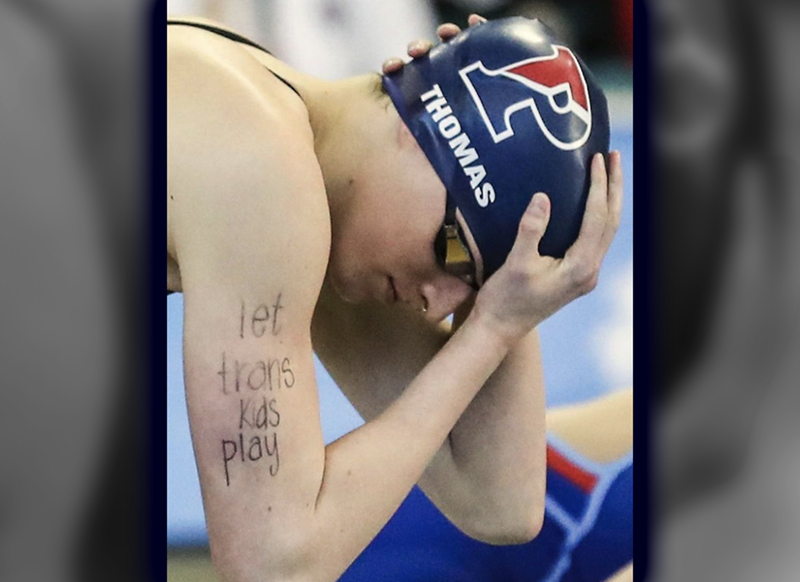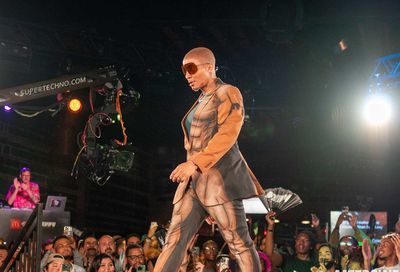Student-athletes demand NCAA stop hosting championships in states barring trans athletes from competition
Letter's signatories chastise NCAA and its president, Mark Emmert, for failing to condemn anti-trans athlete bills.

More than 540 student-athletes across the country have signed a letter calling on the NCAA, the governing body in college sports, to stop hosting athletic championships in states that prevent transgender athletes from competing based on their gender identity.
In the letter, addressed to NCAA President Mark Emmert, the students condemn proposed bills in at least 25 states that seek to restrict transgender athletes from competing. Two of those states, South Dakota and Mississippi, have already passed such bills.
The student-athletes note in their letter that if the proposed laws take effect, the only way to enforce them would be to subject many athletes — including cisgender women — to invasive medical testing (at personal cost to the athlete or their family, as insurance would likely deem the tests medically unnecessary).
Even though current NCAA policy allows trans athletes to compete after undergoing hormone therapy and being “consistent” in their gender identity for more than a year, the organization has been reticent to get involved in the debate over transgender inclusion and whether it unfairly disadvantages cisgender female athletes.
The organization delayed a decision to move some of its “March Madness” men’s basketball playoff games from Idaho in response to that state’s ban on transgender participation, which was signed into law last year.
“We, the undersigned NCAA student-athletes, are extremely frustrated and disappointed by the lack of action taken by the NCAA to recognize the dangers of hosting events in states that create a hostile environment for student-athletes,” the letter to Emmert reads. “HB500 in Idaho, even with the current injunction, is still is an incredibly harmful bill that sets a dangerous precedent of subjecting all women athletes to potential invasive gender verification tests while also effectively banning transgender women athletes from competition.”
See also: South Dakota lawmakers approve bill to ban trans athletes from women’s sports
Noting that lawmakers in nearly two dozen states are proposing laws similar to Idaho’s, the athletes chastise Emmert for being “silent in the face of hateful legislation in states that are slated to host championships, even thought those states are close to passing anti-transgender legislation,” and demand that the NCAA come out publicly against such laws.
“It is imperative that we know we are safe and supported in the NCAA no matter where we travel to compete,” the letter continues. “The reality is that these many of these bills cannot possibly be enforced without inviting policing and bullying of all student athletes who do not meet stereotypes of gender, and could empower any person to force any student athlete to undergo invasive physical exams or hormone tests in order to ‘prove’ their gender.”
The letter has been signed by at least 545 students from over 80 universities and diverse athletic backgrounds. It was started by Aliya Schenck, 20, and Alana Bojar, 21, two track and field athletes from Washington University in St. Louis.
“We’re standing with trans athletes,” Schenck told CBS News. “The big goal is to really make change within the NCAA, but if we can be allies to the trans community and help fight back against this legislation in any way possible, then we’re doing our part.”
Bojar said the NCAA has the power to affect change, as evidenced by its decision to pull seven championships from North Carolina following the passage of a law prohibiting transgender individuals from using publicly-funded, multi-user restrooms and locker rooms that match their gender identity. The loss of championships was cited as one of several factors that eventually led lawmakers to repeal the law.
Anne Lieberman, the director of policy and programs at Athlete Ally, an organization advocating for LGBTQ inclusion in sports, told CBS News that the proposed bills restricting transgender competition are just “another attempt to strip trans folks in this country of their fundamental human rights to exist.”
“All of the anti-trans legislation sweeping the country is in direct violation of the NCAA‘s 2016 nondiscrimination policy for championship events,” Lieberman told Sports Illustrated in a separate interview. “Though the NCAA has continued to monitor the bills and has spoken out in support of trans athletes, the time is now for the NCAA to listen to hundreds of student athletes calling on them to clearly and unequivocally put the health and safety of all student-athletes first and condemn these horrific bills.”
More than 175 female athletes have signed onto an amicus brief in support of a lawsuit brought by a transgender student and a cisgender student that seeks to challenge Idaho’s ban on transgender participation.
Signatories to the brief include tennis star Billie Jean King; two-time women’s soccer World Cup Champion Megan Rapinoe; Candace Parker, a two-time Olympic gold medalist in women’s basketball; Esther Lofgren, a gold medal-winning Olympic rowing medalist; and Katie Sowers, a lesbian offensive assistant coach with the San Francisco 49ers football team. Several other athletes and advocacy organizations have also called on the NCAA to stand up for the principles it purports to value.
“Sports are for everyone, and trans people pose no threat to sports participation or anywhere else,” Serena Sonoma, the communications coordinator and U.S. Southern regional media lead for GLAAD, said in a statement. “The NCAA should follow its own guidance issued to North Carolina years ago, and insist that all states hosting events be inclusive of all who want to participate. The message should be clear and unmistakable: Bans are wrong and trans people belong, in sports and everywhere in the world.”
Read more:
Federal appeals court says “ex-gay” pastor can’t sue Vimeo for removing conversion therapy videos
South Carolina lawmakers strip LGBTQ protections from hate crimes bill
Support Metro Weekly’s Journalism
These are challenging times for news organizations. And yet it’s crucial we stay active and provide vital resources and information to both our local readers and the world. So won’t you please take a moment and consider supporting Metro Weekly with a membership? For as little as $5 a month, you can help ensure Metro Weekly magazine and MetroWeekly.com remain free, viable resources as we provide the best, most diverse, culturally-resonant LGBTQ coverage in both the D.C. region and around the world. Memberships come with exclusive perks and discounts, your own personal digital delivery of each week’s magazine (and an archive), access to our Member's Lounge when it launches this fall, and exclusive members-only items like Metro Weekly Membership Mugs and Tote Bags! Check out all our membership levels here and please join us today!





























You must be logged in to post a comment.